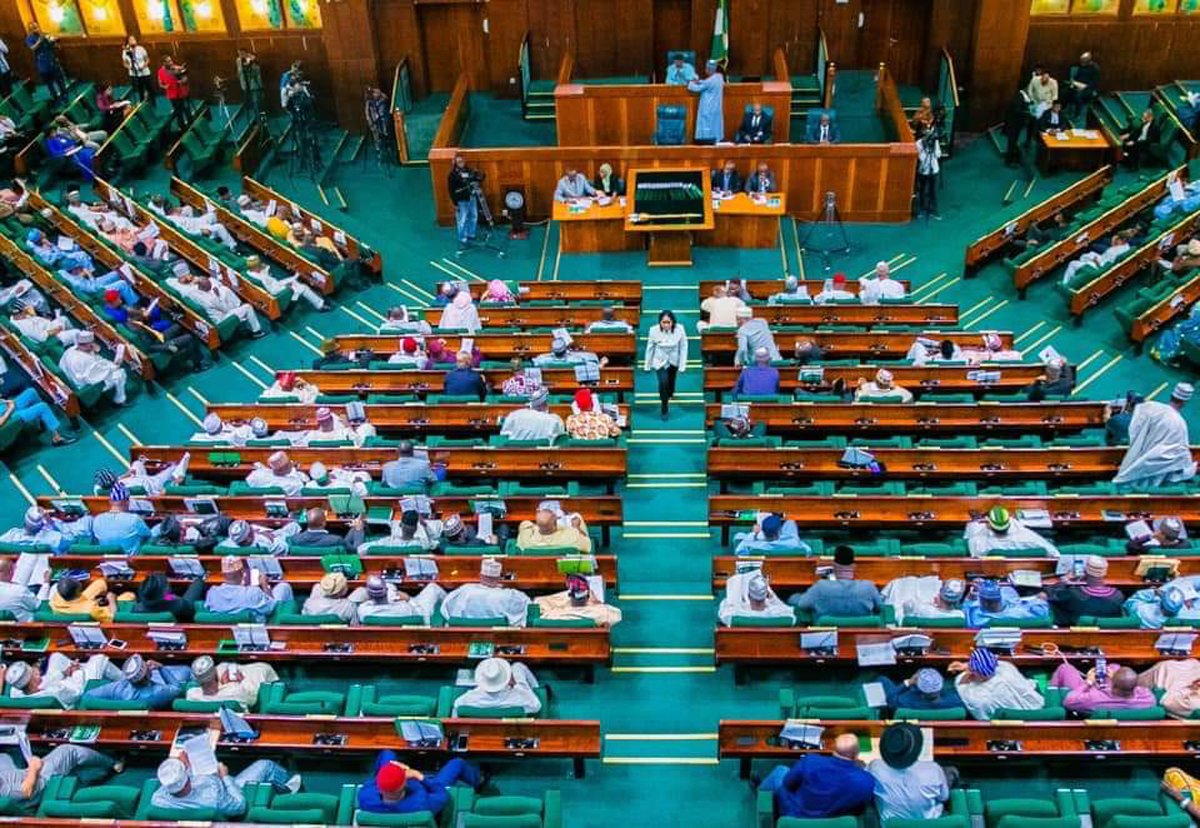News
Reps propose jail term for employers owing salary

Reps propose jail term for employers owing salary
The House of Representatives is proposing a bill to criminalise non-payment or failure to pay salaries by employers of labour and corporate bodies across the country.
When passed into law, employees can demand payment from their employer by submitting a written claim.
The bill, sponsored by Wale Hammed, a member representing the Agege Federal Constituency, Lagos State, titled, “The Employees Remuneration Protection Bill, 2023, has passed its first reading.
Section 7 (1) of the bill provides that it is unlawful for any employer to “Refuse or neglect to pay the remuneration of his employees, as provided under this Act.”
Section 8 (1) of the bill states that if an employee’s compensation remains unpaid beyond the specified period permitted by this legislation, the employee may submit a written demand to their employer for the payment of their entitlement if they wish to assert their claim.
Therefore, “if an employee fails to remit payment within five business days following service of a demand under Section 9 of this bill, the employee may petition the court for redress by filing a motion on notice.”
READ ALSO:
- Child marriage: Bayelsa summons four years old girl’s parents, 54 years old groom
- Portable rejects Okocha’s rematch offer
- Tension in Anambra as Gov Soludo gets 48-hours to resign
- Crisis rocks LP as Edo youths attack 2 members loyal to Apapa [VIDEO]
As per the bill, employers failing to pay their workers’ salaries could face imprisonment for three to six months, without the option of a fine.
Likewise, a company that disregards a court order related to employee compensation may incur a daily fine of N10,000 or face closure for a maximum of three months, provided the default persists beyond two months.
Moreover, the bill stipulates a N10,000 penalty for any official or representative of an organization, government agency, or institution who knowingly allows noncompliance until the directive is adhered to.
Under this proposed legislation, employers must furnish returning employees with written employment terms within 14 working days for contracts extending beyond a month. These contracts, binding for both parties, should comprehensively cover terms, remuneration, payment methods, employment nature, and termination procedures.
Section 27 of the bill provides that an employee’s petition to the court for payment of remuneration shall not serve as grounds for “Disciplinary action, inquiry, suspension, or termination of the applicant by the employer.”
Meanwhile, Section 28 of the bill states that in the event of an employer’s bankruptcy, prioritisation shall be given to the payment of all outstanding remuneration to employees.
Reps propose jail term for employers owing salary
News
Tinubu not telling Nigerians the truth, says Sule Lamido

Tinubu not telling Nigerians the truth, says Sule Lamido
President Bola Tinubu has been accused of not being forthright about the true state of Nigeria under his administration.
Former Jigawa State Governor and senior Peoples Democratic Party (PDP) member, Sule Lamido, made the accusation while speaking on the BBC Hausa programme Gane Mini Hanya.
Lamido criticized both Tinubu and former President Muhammadu Buhari for what he described as a lack of transparency in governance.
“Buhari’s and Tinubu’s governments are not being transparent with Nigerians unlike during the time when PDP was in power where everything was transparent and open to all Nigerians,” Lamido said.
READ ALSO:
- Odili: Fubara prevented Wike from turning Rivers to private estate
- Putin apologises over Azerbaijan plane crash reportedly shot down
- 256 terrorists, two logistics suppliers arrested in one week – DHQ
He accused the two administrations of relying on propaganda rather than providing citizens with accurate information.
Lamido also expressed concerns over President Tinubu’s recent loan requests, questioning the logic behind them. “If Nigerians are being told the truth then there is nothing wrong with that, but how would you budget N30tn, generate N50tn and then request loan when you have a surplus of N20tn,” he said, referencing last year’s budget.
He described the situation as “reckless” and “selfish,” adding, “This recklessness and clear-cut selfishness is not done anywhere in the world, but yet you find (some) Nigerians supporting it. Visit social media and see how APC is being criticised, being referred to as calamity, yet you find some protecting it.”
Tinubu not telling Nigerians the truth, says Sule Lamido
News
Nigeria Customs Service begins 2025 recruitment [How to apply]

Nigeria Customs Service begins 2025 recruitment [How to apply]
The Nigeria Customs Service (NCS) has announced the commencement of its recruitment exercise, assuring Nigerians that the process is entirely free and fair.
The agency has cautioned the public to be vigilant against scammers who may attempt to exploit unsuspecting applicants during the recruitment period.
Applications are invited for positions in the Superintendent, Inspector, and Customs Assistant cadres as part of the Service’s plan to recruit 3,927 officers in 2025.
This initiative is aimed at enhancing trade facilitation and supporting Nigeria’s economic recovery efforts.
“Our recruitment is entirely free and fair. At no stage do we charge fees. Anyone requesting payment is a scammer,” the agency emphasized, urging applicants to be wary of fraudulent schemes.
READ ALSO:
- Dangote, Tinubu, Lookman, Badenoch named among 100 most influential Africans in 2024
- Heavy security in Ilesa as ex-Osun deputy gov emerges new Owa-Obokun
- Hacker has stolen N180m from my NGO account – VeryDarkMan cries out
The NCS outlined eligibility criteria, stating that applicants must be Nigerian citizens by birth, possess a valid National Identification Number (NIN), and have no criminal record or ongoing investigations.
Academic qualifications for the three cadres are as follows:
Superintendent Cadre: A university degree or Higher National Diploma (HND) along with an NYSC discharge or exemption certificate.
Inspectorate Cadre: A National Diploma (ND) or Nigeria Certificate in Education (NCE) from an accredited institution.
Customs Assistant Cadre: At least an O’Level certificate (WAEC or NECO).
In addition to these qualifications, the NCS stressed that all applicants must be physically and mentally fit, providing evidence of medical fitness from a recognized government hospital.
Nigeria Customs Service begins 2025 recruitment [How to apply]
News
Tinubu to critics: I won’t reduce my cabinet size

Tinubu to critics: I won’t reduce my cabinet size
President Bola Tinubu on Monday unequivocally responded to critics who described his cabinet as “bloated” by saying he is unprepared to reduce the size of his 48-man cabinet.
“I am not ready to shrink” the size of my cabinet, Tinubu said during a media chat at his Bourdillon residence in the highbrow Ikoyi area of Lagos State.
“I am not prepared to bring down the size of my cabinet,” the former Lagos governor said, arguing that “efficiency” has been at the core of his selection of ministers.
The president also said he has no regret removing the petrol subsidy in May 2023, saying Nigeria cannot continue to be Father Christmas to neighbouring countries.
READ ALSO:
- Kolawole Erinle: Appeal court affirms sentence for ex-convict over $1.4m fraud
- We’ve forced Lakurawa terrorists back to Mali, says FG
- Petrol: MRS enforces N935 per litre nationwide
“I don’t have any regrets whatsoever in removing petrol subsidy. We are spending our future, we were just deceiving ourselves, that reform was necessary,” he told reporters.
Tinubu appointed 48 ministers in August 2023, three months after his inauguration. The Senate immediately screened and confirmed the ministers. One of the ministers, Betta Edu, was suspended in January while another, Simon Lalong, moved to the Senate.
There were calls for the President to reshuffle his cabinet as many Nigerians have not been impressed by the performance of some of the ministers, especially in the face of unprecedented inflation, excruciating economic situation and rising insecurity.
In October 2024, Tinubu re-assigned 10 ministers to new ministerial portfolios and appointed seven new ministers for Senate confirmation. He also sacked five of his ministers but critics insist that the President’s cabinet remains large, especially with the creation of a Livestock Ministry with a minister.
Tinubu to critics: I won’t reduce my cabinet size
-

 Auto2 days ago
Auto2 days agoLSM MD extols founder’s qualities after latter posthumous industry award
-

 Business3 days ago
Business3 days agoBe creative, monarch, others challenge Muslim professionals on economic revival
-

 Entertainment2 days ago
Entertainment2 days agoMultiChoice announces free access to all DSTV channels for 3 days
-

 metro3 days ago
metro3 days agoJigawa State governor loses son 24 hours after mother’s death
-

 News2 days ago
News2 days agoNigeria Customs Service begins 2025 recruitment [How to apply]
-

 metro2 days ago
metro2 days agoHeavy security in Ilesa as ex-Osun deputy gov emerges new Owa-Obokun
-

 metro2 days ago
metro2 days agoLagos Imam to Tinubu: You haven’t disappointed us
-

 metro2 days ago
metro2 days agoDangote, Tinubu, Lookman named among 100 most influential Africans in 2024 (Full list)













